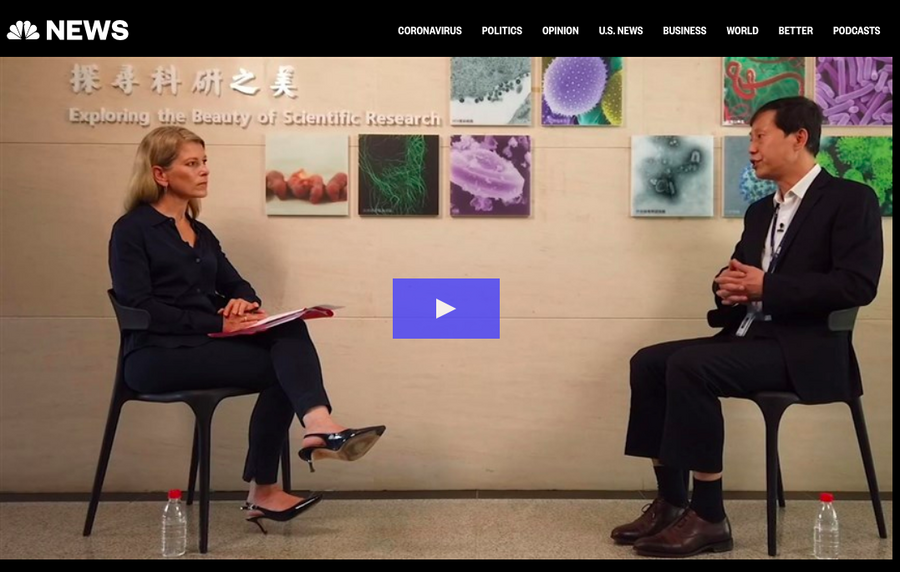
A staff member handles nucleic acid testing samples at a novel coronavirus detection lab in Wuhan, central China's Hubei Province, Feb. 22, 2020. (Xinhua/Cheng Min)
Facing a raging controversy of the leak theory, Wang Yanyi, director of Wuhan Institute of Virology, said "it is unfortunate that we have been targeted as a scapegoat for the origin of the virus."
WASHINGTON, Aug. 12 (Xinhua) -- The currently raging coronavirus "could not have been leaked from a lab," Chinese virologists told U.S. media Monday, calling for more international cooperation during the turbulent period disrupted by the pandemic.

This is a screenshot of NBC's interview with Yuan Zhiming, director of Wuhan National Biosafety Laboratory, released on Aug. 10, 2020. (Xinhua)
"I have repeatedly emphasized that it was on Dec. 30 that we got contact with the samples of SARS-like pneumonia or pneumonia of unknown cause sent from the hospital," Yuan Zhiming, director of Wuhan National Biosafety Laboratory, told NBC News, the first Western media outlet that was invited to the institute since the COVID-19 outbreak in China.
"We have not encountered the novel coronavirus before that ... there is no way that it is leaked from the lab," Yuan stressed.

This is a screenshot of NBC's report "Inside the Chinese lab central to the search for the coronavirus' origin", published on Aug. 10, 2020. (Xinhua)
His remarks were seconded by Wang Yanyi, director of Wuhan Institute of Virology (WIV), who said in her interview with NBC News that the fact that none of the institute's scientists contracted the virus has made it extremely unlikely that the virus could have escaped from the lab.
The WIV, founded in the 1950s, is a renowned research organization that became China's first biosafety level 4 (BSL-4) laboratory. In the wake of the COVID-19 pandemic, the WIV has been the subject of multiple conspiracy theories that the virus was leaked from it.
However, it has been a consensus among the international academic community that the leak theory has no evidence and the virus has a natural origin.

Anthony Fauci, director of the U.S. National Institute of Allergy and Infectious Diseases, testifies at a House subcommittee hearing in Washington, D.C., the United States, on July 31, 2020. (Kevin Dietsch/Pool via Xinhua)
Top U.S. infectious disease expert and health official Anthony Fauci has clarified that current scientific evidence shows it is highly unlikely that the virus was manmade.
"If you look at the evolution of the virus in bats and what's out there now, (the scientific evidence) is very, very strongly leaning toward this could not have been artificially or deliberately manipulated," he noted in an interview published in May by National Geographic.
Peter Daszak, director of EcoHealth Alliance, a global non-profit network that develops solutions to preventing pandemics, also pointed out that there is "absolutely zero evidence that it escaped from a lab."
"The fact that they published the sequence (of the pathogen) so quickly suggests to me that they weren't trying to cover up anything," he added.

People visit a night market at Baocheng Road in Wuhan, central China's Hubei Province, June 1, 2020. (Xinhua/Xiong Qi)
In fact, despite the U.S. administration's repeated allegations that COVID-19 stemmed from a research lab or a wet market in Wuhan, it has failed to provide any proof to back up its claims.
According to NBC News, current and former U.S. intelligence officials said in April that spy agencies had ruled out that the coronavirus was manmade.
Facing a raging controversy of the leak theory, WIV director Wang said "it is unfortunate that we have been targeted as a scapegoat for the origin of the virus."
"Any person would inevitably feel very angry or misunderstood being subject to unwarranted or malicious accusations while carrying out research and related work in the fight against the virus," Wang said.
Despite being unfairly targeted, the Chinese experts called for more international cooperation amid the ravaging COVID-19 pandemic.

A medical expert from Zhongnan Hospital of Wuhan University communicates with Kenyan counterparts via a video call in Wuhan, central China's Hubei Province, March 22, 2020. (Photo by Gao Xiang/Xinhua)
Wang noted that the institute will "fully support" the World Health Organization in its efforts to investigate in the origin of the pathogen, urging that politics should not cloud investigations into how the virus spilled over into humans.
Yuan said the deterioration of U.S.-China relations will hurt scientific cooperation, which is vital to mitigating the outbreak.
"We don't want to see the tension between China and the U.S., because it is not good for the scientific development. It is not good for the progress and stability of the world," he said.
"We have learned a lot from the American scientists in terms of their scientific technology, spirit and relevant experience," he said. "During this pandemic, I think we still need to believe in science, respect science and trust the scientists." ■



